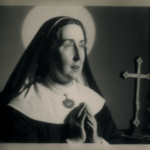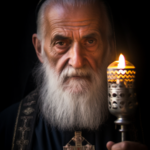
St. Anthony of Padua
St. Anthony of Padua
When he lived: St. Anthony of Padua, also known as St. Anthony of Lisbon, lived from 1195 to 1231.
Where he lived: St. Anthony was born in Lisbon, Portugal, and later lived and performed most of his work in Padua, Italy.
Notable world events during the time of his life:
- Fourth Crusade (1202-1204): The Fourth Crusade, initiated by Pope Innocent III, was originally intended to recapture Jerusalem. However, it deviated from its goal and ended up sacking Constantinople in 1204, significantly altering the political landscape of the Byzantine Empire.
- Magna Carta (1215): In 1215, King John of England was compelled by his barons to sign the Magna Carta, a historic document that established certain rights and limited the power of the monarchy. This event laid the groundwork for modern concepts of constitutional law and individual rights.
- Genghis Khan’s Conquests (13th century): During St. Anthony’s lifetime, Genghis Khan and his successors were expanding the Mongol Empire through a series of military campaigns, which eventually became the largest contiguous empire in history.
- University of Paris Founded (1150-1257): The University of Paris, one of the earliest and most influential universities in Europe, was established during this period. It played a crucial role in the development of scholasticism and intellectual pursuits.
- Invention of the Magnetic Compass (12th century): While not a single event, the invention and refinement of the magnetic compass during the 12th century transformed navigation and exploration, enabling sailors to traverse vast distances with increased accuracy.
Patronage:
St. Anthony of Padua is widely recognized as the patron saint of lost things and lost people. This patronage originates from a legend that speaks of a book of Psalms that he lost and later recovered through prayer. Additionally, he is venerated as the patron saint of the poor, oppressed, and those seeking guidance in their lives. His association with finding lost items has led to a popular devotion where people seek his intercession when they’ve misplaced something important.
An Ardent Desire
Anthony was born in Lisbon, Portugal, about 1195, to a noble family. He was baptized and given the name Fernando. He joined the Canons who adhered to the Rule of St. Augustine, first at the monastery of St. Vincent in his hometown and later at the Holy Cross in Coimbra.
He devoted much of his time to solitude, studying the Scriptures and the Church Fathers, theology, and preaching. In 1220, in Coimbra, Fernando experienced a decisive turning point in his life. During that time, the relics of the first five Franciscan missionaries who had gone to Morocco and were martyred were exposed for veneration. Their story inspired Fernando to imitate them. Hence, he asked to leave the Augustinian Canons to become a Friar Minor.
Fernando’s request was granted. He took the name Anthony and set out for Morocco. However, God had a different plan for him. After he fell sick, he was obliged to return to Italy. In 1221, he participated in the famous “Chapter of Mats” in Assisi, where he also met St. Francis. Then he lived for a period of time in solitude in the convent of Forli, Northern Italy. It was there that God called him to another mission.
Called to Preach and Teach
Anthony was invited to preach during a priestly ordination, a somewhat casual circumstance. He showed himself to be endowed with such knowledge and eloquence that the superiors assigned him the task of preaching. This paved the way for him to embark on apostolic work in France and Italy, with such great progress that many people who had left the Church returned.
He was also one of the first, if not the first, to teach theology to his brother in the Friars Minor. With the blessing and recognition of St. Francis himself, Anthony began his teaching in Bologna. Anthony laid the foundations of Franciscan theology, which was later developed by other brilliant thinkers such as St. Bonaventure of Bagnoregio and Blessed Duns Scotus.
Anthony occasionally taught at the universities of Montpellier and Toulouse in southern France, but he performed best in the role of a preacher. His teaching was so simple and resounding that even the innocent and those who were unlettered could understand his message. A story was told that when Anthony attempted to preach to heretics who would not listen to him, he went out and preached his message to the fish. When the people saw the fish begin to gather, they realized they should also listen to what Anthony had to say.
Subsequently, Anthony became the Provincial Superior of the Friars Minor in northern Italy. He continued his ministry of preaching, alternating it with his office of governance. When he ended his term as Provincial, he withdrew to a place near Padua, where he had stayed on various other occasions. Less than a year later, Anthony died at the city gates on June 13, 1231. Only a year after his death, because of the miracles brought about through his intercession, Pope Gregory IX canonized Anthony. His feast day is June 13.
5 Interesting Facts About St. Anthony of Padua
- St. Anthony of Padua is the patron saint of the poor, of sailors and fishermen, of priests, and of travelers. But he is more famous as the saint to be invoked for lost articles.
- St. Anthony of Padua’s remains were exhumed some 336 years after his death. It was found out that his body was corrupted except for his tongue, which was totally incorrupt—the same tongue that formed and spoke perfect teachings.
- In Christian art, St. Anthony of Padua is often depicted with a book in his hands, with a lily or torch, or carrying the Child Jesus in his arms.
- St. Anthony of Padua was declared a Doctor of the Church by Pope Pius XII in 1946.
- St. Anthony of Padua is one of the saints who were canonized in a short span of time.
Prayer to St. Anthony of Padua
Almighty, ever-living God, who gave Saint Anthony of Padua to your people as an outstanding preacher and an intercessor in their need, grant that, with his assistance, as we follow the teachings of the Christian life, we may know your help in every trial. Through our Lord Jesus Christ, your Son, who lives and reigns with you in the unity of the Holy Spirit, one God, for ever and ever Amen.



